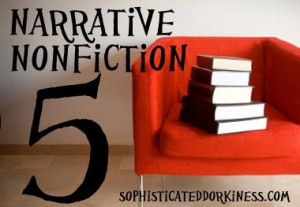 This is, I think, the oddest Narrative Nonfiction 5 list that I’ve put together. I’m not really that passionate about ocean creatures, but I just happened to see a lot of books on this topic come out recently that looked interesting, and the list sort of fell together from there. And, I have a special guest recommendation from a friend Erin, a science journalism student at UW-Madison where I did my Master’s.
This is, I think, the oddest Narrative Nonfiction 5 list that I’ve put together. I’m not really that passionate about ocean creatures, but I just happened to see a lot of books on this topic come out recently that looked interesting, and the list sort of fell together from there. And, I have a special guest recommendation from a friend Erin, a science journalism student at UW-Madison where I did my Master’s.
But enough with the introduction, on to the books!
The Secret Life of Lobsters by Trevor Corson (2004)
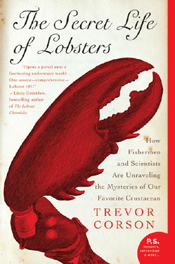 This is the one book on the list that I have read, and it’s one of my favorite odd narrative nonfiction books to recommend to others. What I love about the book is that Corson is able to take something I am not at all interested in – lobsters – and make them the center of a highly entertaining story. If you want more gushing, I’ll just send you over to my review.
This is the one book on the list that I have read, and it’s one of my favorite odd narrative nonfiction books to recommend to others. What I love about the book is that Corson is able to take something I am not at all interested in – lobsters – and make them the center of a highly entertaining story. If you want more gushing, I’ll just send you over to my review.
As a bonus, I’ll add Corson’s second book The Story of Sushi: An Unlikely Saga of Raw Fish and Rice (2008) to the list – another book I enjoyed, but don’t have quite the same zealous affection for.
Eels by James Prosek (2010)
Eels: An Exploration, from New Zealand to the Sargasso, of the World’s Most Mysterious Fish
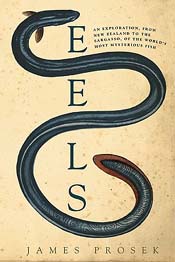 I’m pretty sure Eels is the first book I randomly saw in a publisher catalog that made me wonder how many books I could find about ocean creatures. From the description, it sounds like the book is a look at the mystery that is eels, but also a sort of sociological story about the role eels play for different cultures. I find eels quite creepy – they remind me too much of snakes, which terrify me – but I am excited to read the copy of this book I got from a friend.
I’m pretty sure Eels is the first book I randomly saw in a publisher catalog that made me wonder how many books I could find about ocean creatures. From the description, it sounds like the book is a look at the mystery that is eels, but also a sort of sociological story about the role eels play for different cultures. I find eels quite creepy – they remind me too much of snakes, which terrify me – but I am excited to read the copy of this book I got from a friend.
Four Fish by Paul Greenberg (2010)
Four Fish: The Future of the Last Wild Food
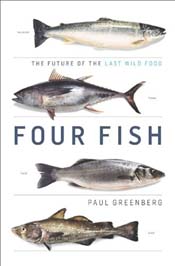 Four Fish is an investigative book about global fisheries, written by Paul Greenberg, a seafood writer for the New York Times (aside, I didn’t know that was an actual beat at a newspaper). The four fish in question are salmon, tuna, bass, and cod, and are a dominant part of the global market for seafood. I added this book to the list because it sounds interesting and may also be a good context for the other books on the list.
Four Fish is an investigative book about global fisheries, written by Paul Greenberg, a seafood writer for the New York Times (aside, I didn’t know that was an actual beat at a newspaper). The four fish in question are salmon, tuna, bass, and cod, and are a dominant part of the global market for seafood. I added this book to the list because it sounds interesting and may also be a good context for the other books on the list.
The Whale by Philip Hoare (2010)
The Whale: In Search of the Giants of the Sea
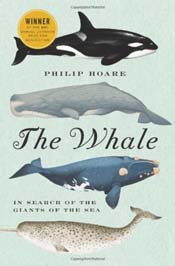 This is a book that actually hasn’t come out in the U.S. yet This book came out in the U.S. last year, and I saw it mentioned as one of CS Monitor’s best nonfiction books of 2010. The British version, Leviathan, was awarded the 2009 Samuel Johnson Prize, a British award for nonfiction. After reading Moby Dick, Hoare said he became captivated by whales and spent years trying to learn more about them. Interestingly, Hoare isn’t a naturalist or science writer – he’s a biographer – which I think will bring a cool perspective to the topic. (Thanks for the correction, Eva!)
This is a book that actually hasn’t come out in the U.S. yet This book came out in the U.S. last year, and I saw it mentioned as one of CS Monitor’s best nonfiction books of 2010. The British version, Leviathan, was awarded the 2009 Samuel Johnson Prize, a British award for nonfiction. After reading Moby Dick, Hoare said he became captivated by whales and spent years trying to learn more about them. Interestingly, Hoare isn’t a naturalist or science writer – he’s a biographer – which I think will bring a cool perspective to the topic. (Thanks for the correction, Eva!)
The Windward Road by Archie Carr (1956)
The Windward Road: Adventures of a Naturalist on Remote Caribbean Shores
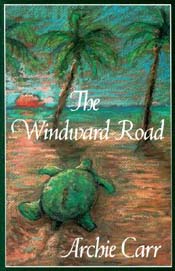 I got this book recommendation from my previously mentioned friend Erin, who came to my rescue when I was having a hard time finding a great book to finish out this list. Here’s what Erin had to say about the book:
I got this book recommendation from my previously mentioned friend Erin, who came to my rescue when I was having a hard time finding a great book to finish out this list. Here’s what Erin had to say about the book:
The book is about Carr’s adventures in the Caribbean researching sea turtles. … It’s not flawless, but it was really good, enjoyable, won the John Burroughs Medal for nature writing, brought what’s as far as I’ve read the first international attention to Caribbean sea turtle conservation, and prompted Joshua Powers to found what would eventually become the Sea Turtle Conservancy. I read a description of Carr somewhere as the Rachel Carson of sea turtles.
An interesting part is I have a later edition (it was originally published 1956), and in the preface Carr expresses regret that he spent so much time talking about how delicious the turtles were, because he was a really old-school naturalist back then, haha; later he stopped eating them, although he still thinks they taste good.
So there you have it, five narrative nonfiction books about creatures of the sea. I know they sound a little odd, but I think that’s the best reason to give narrative nonfiction a try. If done well, the writing and story can make even the oddest topic seem completely fascinating.

Comments on this entry are closed.
The Whale has definitely already been published here; I read it last year. 🙂 (It didn’t live up to my expectations but oh well.)
I’d add Carl Safina’s Voyage of the Sea Turtle; I read it a few years ago and loved it. And I’ve been eyeing Cousteau’s Great White Shark by Jean-Michel Cousteau, though I haven’t gotten to it yet.
I happen to love reading books about specific animals, so this list didn’t seem odd to me!
Thanks for the correction on The Whale, Eva! I was looking at the paperback release date, rather than the hardcover. I’m bummed it wasn’t quite as good as you hoped!
Both of your other suggestions look fun too. I’m not a big animal person, myself, so doing an entire list of books on animals seemed weird to me. But I do love nonfiction about random topics, so I guess animals isn’t really off limits, either 🙂
Those paperback release dates are so tricky! 😉 I wish I’d posted about The Whale, because it sounded SO good but I honestly didn’t like it at all. I kept putting it to one side and then forcing myself to pick it back up. I’ve had mixed luck with the Samuel Johnson award winners in general though.
Eva: That’s a bummer, I was excited to find a nonfiction award to start paying attention to. I’ll have to go investigate it and see what other books might pop off the list.
I just got really excited about The Whale and now I am not after reading Eva’s comment! I love that this list sort of fell together. I kind of love ocean creatures, so I’ll probably be adding a couple of these to my TBR. Thanks Kim!
Lu: I’m still moderately excited — enough to grab it at the library and see if it’s good sometime later in the year. I loved the way the list feel together too; it’s one of my favorite ways to write one of these posts.
I adored The Secret Life of Lobsters! I also want to read Kurlansky’s OYSTER book.
Care: Me too! It was such an unexpectedly awesome book.
I’m a bit surprised not to see Mark Kurlansky’s COD, which I am tempted to read even though fish gross me out, on the list. On the other hand, I think that’s a pretty well-known one, so it is great that your list is more diverse. A great way to wrap up reading from a list like this would be to grab Simon Winchester’s ATLANTIC, which is a biography of the sea itself.
Jen: Good recommendation. I actually have never heard of that one, which seems pretty weird since now that I’ve looked it up it’s pretty obviously famous. Clearly I am not up on my seafood nonfiction canon 🙂
I have Atlantic on my shelves now. Can. Not. Wait!
I don’t think they’re odd at all, on the contrary they look quite interesting! I read a few books about sea creatures last year, particularly enjoyed Voyage of the Turtle by Carl Safina- an excellent book about sea turtles. I’ve got another one about seahorses on my list, but haven’t read it yet. I guess sea creatures fascinate me because they seem so alien and I know so little about them!
Jeane: Oh good, I’m glad it’s not too odd :)Thanks for the recommendation, that one sounds like fun too. Sea turtles are fascinating.
I really enjoyed The Secret Life of Lobsters and read it as a companion piece to David Foster Wallace’s essay on lobsters in Consider the Lobster. All good things to know for a person who loves to eat lobsters.
Jeanne: Ooo, that’s a good idea for companion reading. I’ve actually never read that essay by David Foster Wallace.
Me, neither! But it’s been on the list for awhile.
Thanks for including Dr. Archie Carr’s book. Check out our post on Facebook about the blog entry: http://facebook.com/conserveturtles
Rocio: Thank you for linking to this post, that’s exciting!
Interesting how similar the covers for The Whale and Four Fish are! The book on lobsters looks especially interesting to me because I happen to love lobsters (as much as one can love a crustacean, I suppose). Great list!
Cass: Yeah, I was struck by the similar covers too. I loved the lobster book, and it’s definitely recommended.
What a great list! I really enjoyed Eels and have the lobster book on my tbr. The others I definitely want to read at some point too!
Amy: I think I put Eels on the list after seeing your review of it. It looks like a good one 🙂
What a lovely and strange round up of books!
Trisha: Thanks! I love finding lots of books on sort of odd topics 🙂
I wanna read about turtles !
Maphead: Turtles are fun!
I am definitely buying “The Whale” for starters. I have Prosek’s “Early Love and Brook Trout,” what a great book driven by great art.
Dan: I hope you enjoy The Whale! Prosek’s other book sounds good, too.